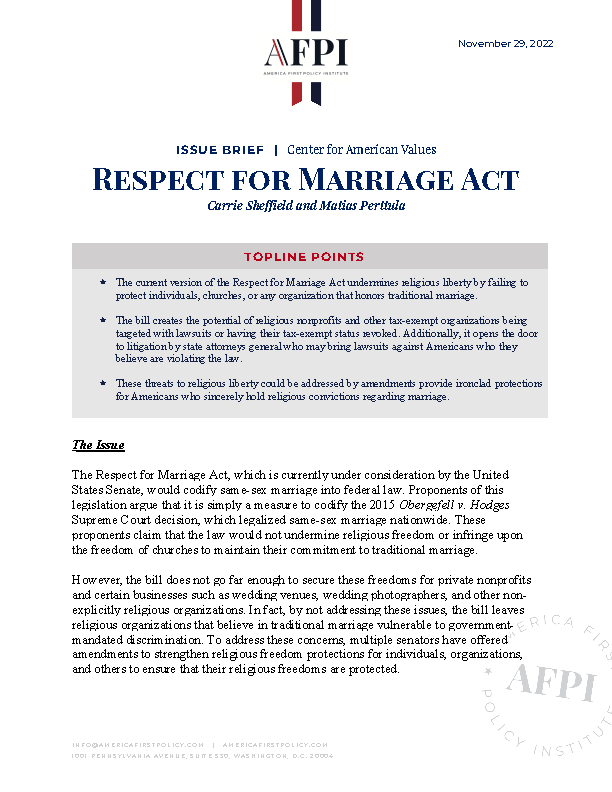Respect for Marriage Act
Key Takeaways
The current version of the Respect for Marriage Act undermines religious liberty by failing to protect individuals, churches, or any organization that honors traditional marriage.
The bill creates the potential of religious nonprofits and other tax-exempt organizations being targeted with lawsuits or having their tax-exempt status revoked. Additionally, it opens the door to litigation by state attorneys general who may bring lawsuits against Americans who they believe are violating the law.
These threats to religious liberty could be addressed by amendments provide ironclad protections for Americans who sincerely hold religious convictions regarding marriage.
The Issue
The Respect for Marriage Act, which is currently under consideration by the United States Senate, would codify same-sex marriage into federal law. Proponents of this legislation argue that it is simply a measure to codify the 2015 Obergefell v. Hodges Supreme Court decision, which legalized same-sex marriage nationwide. These proponents claim that the law would not undermine religious freedom or infringe upon the freedom of churches to maintain their commitment to traditional marriage.
However, the bill does not go far enough to secure these freedoms for private nonprofits and certain businesses such as wedding venues, wedding photographers, and other non-explicitly religious organizations. In fact, by not addressing these issues, the bill leaves religious organizations that believe in traditional marriage vulnerable to government-mandated discrimination. To address these concerns, multiple senators have offered amendments to strengthen religious freedom protections for individuals, organizations, and others to ensure that their religious freedoms are protected.
One of these amendments, which has been proposed by Senator Mike Lee, would restrict the federal government from discriminating against any individual or institution based on a sincerely held religious belief or moral conviction regarding traditional marriage. This amendment would safeguard religious freedom by ensuring that government bureaucrats do not discriminate against those who believe that marriage is, or should be recognized as, a union of one man and one woman.
Additionally, amendments offered by Senator Marco Rubio and Senator James Lankford, would provide further clarity and protection for individuals who have sincerely held religious beliefs regarding marriage. The amendments would strike the private right of action to provide insulation for faith-based service organizations with these beliefs. They would also provide much-needed clarity regarding multiple aspects of the bill to ensure that faith-based agencies and private individuals do not incur any harm as a result of this legislation. Specifically, the added language would provide a clear definition of faith-based organizations that partner with the government for services. These faith-based organizations would not be considered government actors, but instead, they would be considered separate, non-governmental entities to ensure the bill’s mandates would not affect them. Furthermore, the added language clarifies that the bill will not be used to penalize, harm, or discriminate against an individual’s or an entity’s belief or practice of marriage.
Question and Answer
Q: Will the Respect for Marriage Act (as it is currently written) target faith-based institutions for discrimination from the government by denying contracts, grants, or licenses?
A: In its current form, the bill does not provide clear language to protect these institutions. Therefore, the amendments from Senators Lee, Rubio, and Lankford are critical added layers of protection for Americans.
Q: How does the Respect for Marriage Act affect everyday Americans?
A: While the law’s effects may not be immediately felt by most Americans, the bill’s lack of clarity opens the door for discrimination, legal threats, and other major problems for individuals, organizations, businesses, and others who choose to hold religious convictions regarding marriage.
Q: What is an example of a real impact of the law in its current form?
A: One example is if a same-sex couple wants to be married in a wedding venue that adheres to a traditional view of marriage (one biological man and one biological woman). In this case, the same-sex couple could bring litigation against that venue on the basis that the venue has “caused harm” to them by violating the Respect for Marriage Act.
References for the Supporting Information
- Respect for Marriage Act: Why religious liberty deserves protection and my amendment will provide it | Fox News
- Second Key GOP Senator Announces Support for Lee Amendment (dailysignal.com)
- H.R.8404 - 117th Congress (2021-2022): Respect for Marriage Act | Congress.gov | Library of Congress
- The Respect for Marriage Act | The Heritage Foundation
- New Polling Shows Americans Reject ‘Respect for Marriage Act’ Assault on Religious Liberty | The Heritage Foundation
- Respect for Marriage Act | Alliance Defending Freedom (adflegal.org)
Center for American Values
Paula White, Chair, Center for American Values
Carrie Sheffield, Director, Center for American Values
Matias Perttula, Deputy Director, Center for American Values
